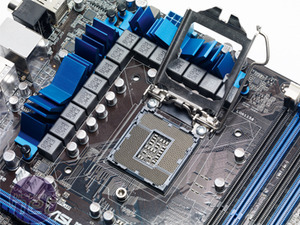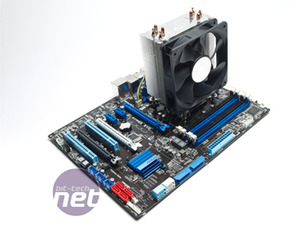Cooling LGA1156
In it's infinite wisdom (ahem!) Intel has designed the LGA1156 socket so that it's neither compatible with LGA775 nor LGA1366. This has a series knock on effect on CPU cooler design, as the spacing between the mounting holes in the motherboard are subtly different between each CPU type.For example the holes in LGA775 motherboards are spaced 72mm apart, while LGA1366 motherboards have holes spaced 80mm apart. In contrast, according to Intel the holes in a LGA1156 motherboard have to be 75mm apart. This is only a few mm different from LGA775, but either means that cooler manufacturers need to come up with new a whole new design, or at the very least design a new mounting mechanism.
Fortunately, Cooler Master was able to provide us with a sample of its first LGA1156 CPU cooler - the Hyper 212 Plus. This tower cooler sports four direct-contact heatpipes that pass over the CPU heatspreader and conduct heat into a large nest of aluminium fins above. These in turn are cooled by a PWM controlled 120mm fan that spins between 600 and 2,000rpm. If LGA1156 isn't your thing then the Hyper 212 Plus is also compatible with LGA775, LGA1366 and Socket AM2+/AM3 CPUs.
Although we don't have any other retail LGA1156 coolers to hand right now, the Hyper 212 Plus appeared to a very good job of keeping our Lynnfield CPU cool. At idle the four cores of the CPU hovered around 36C, while at load they never broached 60C.
... and those pesky benchmark results
Although we've spent a lot of time benchmarking and overclocking the Asus P7P55D Evo, we promised Intel that we wouldn't reveal any performance results just yet. However, we can say that the Asus P7P55D Evo and the (non early Engineering Sample) LGA1156 Core i7 CPU perform extremely well and are very easy to overclock well beyond their stock frequencies. Having seen what the LGA1156 platform is capable in terms of performance it's clear that both LGA1366, but more importantly Socket AM3, will have a real fight on their hands later this year.In terms of overclocking, LGA1156 CPUs behave in the same way as LGA1366 CPUs - to overclock the CPU, you need to increase the QPI/baseclock from its default of 133MHz. Once again we can't got into specifics, but with the aforementioned Cooler Master Hyper 212 cooler and a not unreasonable amount of extra voltage we could stably benchmark our test CPU with at least a 1.2GHz overclock on all cores.
In conclusion, the Asus P7P55D Evo shows a lot of promise, and while Asus was unable to confirm the price, given the positioning of the Evo brand beneath Deluxe, it's likely that the first LGA1156 motherboard will be competitively priced.

MSI MPG Velox 100R Chassis Review
October 14 2021 | 15:04











Want to comment? Please log in.